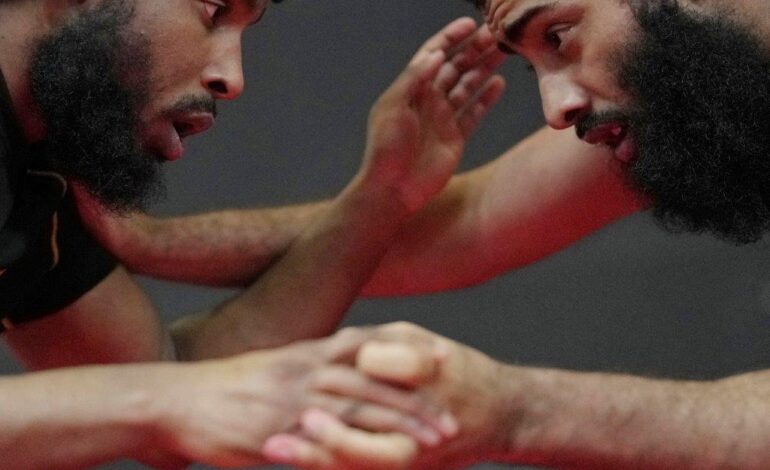Muslim athletes push boundaries, keep training during Ramadan fast

LONDON (AP) — Approaching midnight, the hard work is just beginning for Sabir Hussein.
Trains running on the elevated railway above Diesel Gym in East London’s docklands are mostly empty. Inside, a mixed martial arts session awaits.
Hussein’s 10:30pm agenda: escaping front headlocks, plus perfecting single-leg takedowns.
The timing is far from ideal, but during the holy month of Ramadan, Muslim athletes around the world adjust their schedules to squeeze in workouts when they can.
Dawn-to-dusk fasting poses obstacles about the best time to exercise — if it’s an option — because it can adversely impact sleep and energy levels, something anyone who has joined the intermittent fasting trend might have experienced.
“Not training at all — that’s not an option,” the 27-year-old Hussein said.
Hussein is an emerging MMA flyweight who plans to fight again in early June. He has a 4-2 amateur record and hopes to turn professional later this year.
“If I don’t train, I’ll fall behind in terms of my fitness. Once I start picking things up after Ramadan — it would be a lot harder if I didn’t train throughout the month.”
The late-evening classes held every night during Ramadan are run by the nonprofit SCK Fitness Team, co-founded by Hussein and Warsame Ibrahim. The disciplines include MMA, boxing and Muay Thai. It’s 5 pounds ($6) a session with proceeds going to charity; a women-only class is free.
By the time the three-dozen athletes — a wide range in ages and skill levels — kick off their footwear and stretch it’s been about four hours since “iftar” when they’ve broken their fast, followed by prayers at their mosque.
The downside of late workouts? The resulting adrenaline can make it hard to fall asleep — and that’s no fun ahead of a 4am wakeup call for prayers and a pre-dawn meal called “suhoor.”
“If I have a hard session, I might stay up for another hour or two. I might get to bed around 2:30am,” said Hussein, adding that after a light session he falls asleep easily.
On a recent evening, it looked like something in between. About halfway through, Hussein hadn’t yet broken a sweat despite humid conditions that sent others searching for their water bottles in the wall cubbies after Ibrahim paused the “nasheed” Islamic hymn for a one-minute break.
The gym — home to several UK champions — includes a boxing ring, an MMA cage and the wrestling mats where most of the training takes place.
Outside of Ramadan, the Somali-born Hussein would train mid-morning, work in the afternoon as a kids’ boxing coach and personal trainer, and do MMA sessions between 6pm and 9pm.
During the holy month, which is expected to end around April 9 this year, Hussein tries to get in a workout early in the morning and if he’s lucky a nap in the afternoon before the late-night sessions.
“But the majority of the time I work throughout the day,” he said. “I’ve got to still get my bills paid at the end of the day.”
Asma Aloui, assistant professor of sports sciences at the University of Sfax in Tunisia, said training an hour or two before breaking fast allows athletes “to replenish their nutrients and fluids immediately after the session.” This timing is also good because “strength-induced hormonal secretion” is at its peak, regardless of fasting.
“Thus, this period does not significantly disrupt sleep patterns and better prepares athletes for competition,” she said in a written response to questions.
Late-night training also likely wouldn’t align with daytime competitions — like a soccer game that kicks off in the afternoon. And some leagues are less accommodating to Muslim players than others.
“Athletes may find it challenging to adapt to daytime competitions during Ramadan, leading to considerable impact on performance,” Aloui wrote.
Training in the morning is “not advisable,” she added because the “recovery processes are hindered by the absence of food and fluid intake.”
Haroon Mota, founder of Muslim Runners and Active Inclusion Network, has been training for the London Marathon on April 21.
He posted video updates while completing a recent 20-mile run while fasting. Three hours into it, the Coventry resident said: “My mouth is so, so dry, dying for a sip of water even just to rinse my mouth out.”
Ahead of last year’s race he offered his tips on training during Ramadan — still available on the London Marathon website.
As Mota completed his 20-miler just before iftar he added: “I feel like crying, tears of maybe joy and blessings… alhamdulillah.”
Ramadan, of course, is a time of sacrifice and growing closer to God through fasting and good deeds.
“The schedule gets a bit crazy. It does intervene in your sleep. However, it’s all worth it because it’s all a spiritual journey,” Hussein said.
“For us, that’s worth the lack of sleep or the lack of energy during the day.”
___
By KEN MAGUIRE AP Sports Writer





